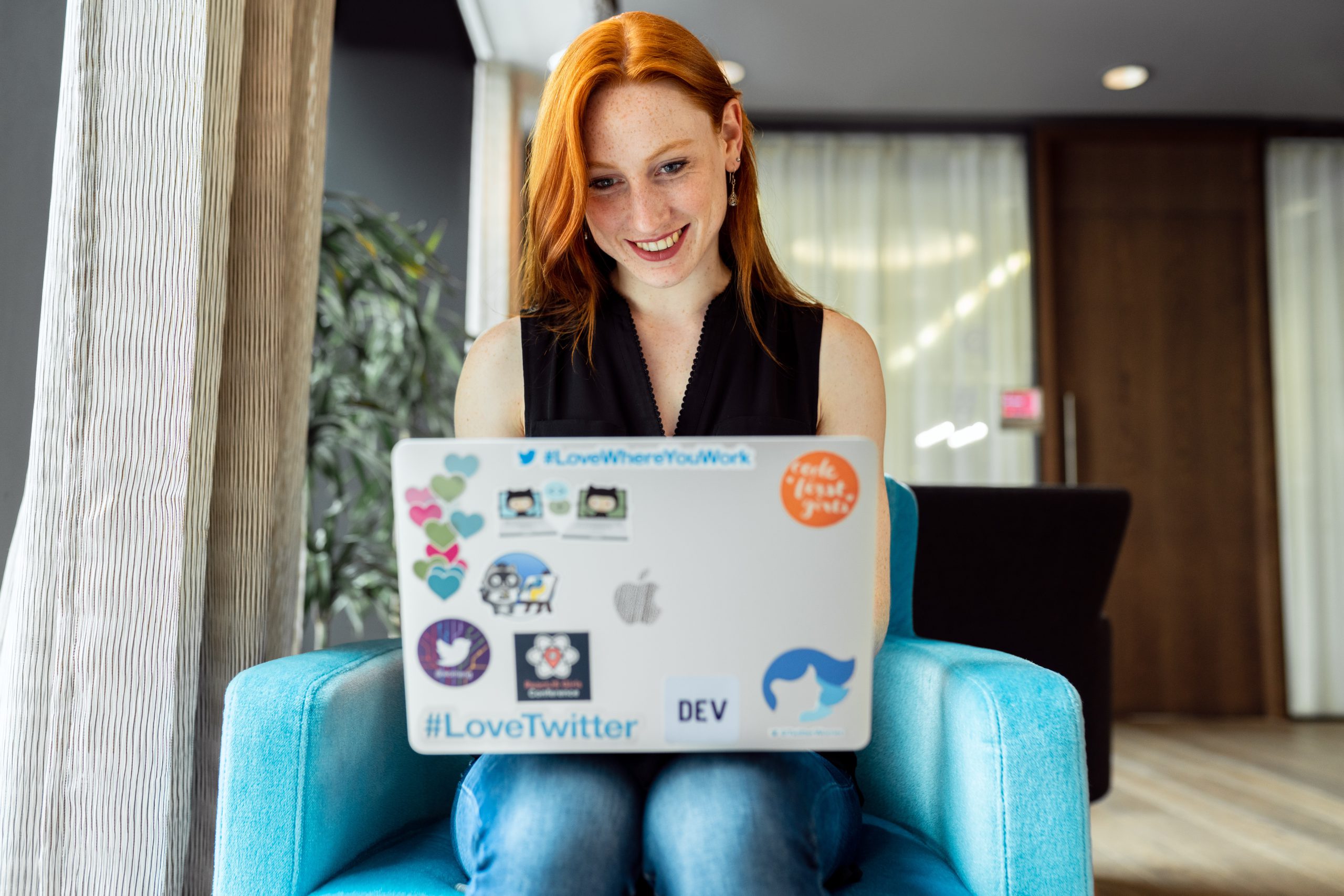If you’re considering learning to code or are curious about it and want to know more, you’ve come to the right place. There’s a ton of buzz around getting into coding these days, and it’s easy to understand why. The market is growing, and the need for developers is rising. It’s been estimated that between 2020 and 2030, software development projected growth rate will be at 22%, compared to the measly 8% for all other occupations. (BLS)
So, anyone looking for a career change should strongly consider learning code. But how can you learn?
Well, here are the four most common routes:
Let’s start with number one…

If you want to get a job in the tech industry and learn to code, then getting a degree is one of the best ways to go. It’s also one of the most flexible options. Computer science degrees have a lot of different specialisations, so you can choose what you want to study and how much time you want to focus on coding.
For example, studying computer science is perfect if you want to be a software engineer focusing on making mobile device apps. It gives you all the necessary technical knowledge while also giving plenty of hands-on practice and experience opportunities. You will be using real-world tools like Android Studio or Xcode.

“From a young age, my interest in basic computers, like the Amstrad CPC464 electronic circuits, started by messing around with basic bode and repairing broken radios with my soldering iron. This start drew me towards an Electronics Engineering college course where I created basic logic programs to work on the circuits I made.
I decided to focus on Electronics at first when heading off to university. But eventually, I decided to change to Computer Science, with fewer complex Maths and Physics, which catered to my love of logic puzzles.
On graduating from university, I started my first job as a website developer using languages that are now long past but helped me understand how the industry works. Moving from job to job, I enjoy the diversity that coding offers and seeing new technologies crop up with creative persons starting from a similar beginning as myself.”

“When I was about 8, my dad and I used to stay up late creating animations in Adobe Flash. This then led to us writing ActionScript 2.0 and making little games. My dad then showed me some VBA, and we did some VB.NET. He didn’t have any qualifications but taught himself alongside teaching me.
From that, I then went to college and university to study computing. I got a job at Acclaimed Computers and then AM Labels, where I learned much more programming and started using C#. I have now programmed Windows forms, websites, and Android and iPhone apps (although the iPhone app was never released). Though I did release an iPhone game, it had the worst graphics…”

“I started programming at college as part of an Access to Higher Education IT diploma. Before that, I had never seen or written any code, so it was all new to me back then. I was far from a ‘natural’ at programming. However, after a few more years at university studying Information Technology Management, with writing code as a principal component, I soon realised that software development was the only part of my studies I was interested in. And although I was still not especially good at it, I would attempt to make a career out of it. As a result, I finished my BSc. I found an employer willing to start me off working as a Junior Web Developer. Since then, my current position at Encodian has been my third Software Developer role. I also recently completed an MSc in Software Engineering to help improve my employability.”

“The roots of my interest in coding are from gaming. I loved my PlayStation 1 and Game Boy Colour from a very young, I was playing Pokémon before I could even read. I had always wondered how a game could remember my name, how the game goes from the physical media of a cartridge or disk to ‘in’ the system, how AI characters work etc.
Coding wasn’t straightforward to learn about as a youngster. But I remember wanting to study Computer Science from a young age but not knowing anything about coding. I didn’t get a chance to learn about coding in school, so it wasn’t until I was in college that I started coding in my spare time. What drove me was the thought of preparing myself to study Computer Science at university.
It’s been great to see this changing over the years with a big push to expose kids to coding. Of course, there are also many brilliant interactive online resources, like CodeAcademy.”

“When I was younger, I had a fascination for computers and video games, as with most kids in the 90s era. When I got to university, I decided to pursue a degree in Computer Science to become a games developer. Still, I was quickly demoralised after seeing how difficult that was. I still managed to complete my degree and went on to do some IT support roles, which I did not find challenging enough. Eventually, I was introduced to Microsoft SharePoint, which reignited my interest in web development. Whilst doing SharePoint admin-type roles, I started learning SharePoint development by self-learning and being mentored by experienced developers. I eventually got involved in projects, which is how I got into coding. Since then, I’ve undertaken various development projects and thoroughly enjoyed my coding journey!”

An apprenticeship is an excellent option if you’re unsure where to start. Apprenticeships are often paid opportunities to help you learn how to code while earning money. You can find available apprenticeships on websites like LinkedIn and Glassdoor, which list jobs across different industries that might be right for you. Or you could just type your city and “coding apprenticeship” into Google and see what comes back!

“So, I started by teaching myself how to code. I had just left a job and didn’t know what I wanted to do next. My friend had just started learning how to code, and I played a lot of video games then, so I thought, why not give it a go? After creating a personal website for myself, I started applying for apprenticeships. I managed to get one in a design company. Fast forward sometime later, and now I’m here!”

Attending a coding bootcamp is a great way to start if you want to get into coding. The best part? It’s not as expensive or time-consuming as it sounds.
Coding bootcamps are short-term training programs that aim to teach students the skills to become professional developers. These programs usually last from four weeks to three months, depending on what kind of bootcamp you choose and how much time you have available for learning. Bootcamps offer small group sizes (typically 10–15 students), which means that each student gets individualised attention from their instructors and peers during their studies. Suppose you’re looking for a quick introduction to programming with some hands-on experience under your belt. In that case, these courses may be right up your alley!

“I got into the coding industry during the start of the covid pandemic. I had zero coding experience, and my previous job was as a restaurant barman.
A company offered me a home-based Junior Developer role using the Microsoft Power Platform low-code solution. From there, I was guided by good people who helped me understand coding better and enjoyed solving or creating apps. The company had some difficult times, and I was let go due to my experience. So, while looking for another job, I attended Firebrand Code Training Bootcamp to further my skills and show my passion for coding.
I did not give up after the first job, and now I am happily working in Encodian with more professionals that can help me progress in my career. I enjoy coding because I love computers, creating and solving ideas. One day, I hope I can be a bit like the person I look up to.

If you’re not a fan of learning in a classroom, or if you don’t have access to classes in your area, then learning to code online is the way to go. Plenty of free resources for beginners can get you started with coding and teach you the basics.
Some websites offer paid courses as well. However, these generally cost less than $200 and include lifetime access so that once a course is completed, there’s no need to pay again. You also have the option of self-paced learning where your progress doesn’t depend on anyone else’s schedule but yours! Although it might take longer than attending an actual class where someone is teaching everyone at once, it allows you to learn at your own pace. This may be more suitable if finances are limited or time constraints are present (e.g., holding down another job).

“Home computing wasn’t really a thing when I was younger, but being a bit of a geek at school in the 70s meant I spent my time tinkering with electronics and microprocessors. By the time the 80s arrived, home computing was just starting to catch on, and my friend’s dad bought a Commodore PET (Google it), and I was blown away. I began learning the BASIC language and coding structures on it, and I knew I wanted to be a games developer!
When my working life started, though, it was in the more mundane world of telecoms… Nonetheless, the PC age was now upon us, and I still kept my hand in. I realised that I could use my coding skills to write PBX configuration utilities for comms packages and consequently found that I loved making people’s jobs easier. Forget game development, this was my true calling!
I learned VBScript and VBA in the 90s, then moved onto C# in 2006 with a focus on SharePoint solutions, which in due course expanded into PowerApps in 2019. Although PowerApps is touted as a low-code/no-code product, already having coding practices, knowledge, and experience helps me to exploit its capabilities when creating solutions with it.
So, without formal training or going to university, I carved out a career in coding that took me from using the abacus to today. All I can say is, you can teach an old dog new tricks – it just requires many more biscuits (preferably chocolate).”
If you’re a beginner, don’t worry that there’s so much more to learn. Just keep working at it and learning new things daily, and remember that your first few projects won’t be perfect. It’s normal for people to feel frustrated when they make mistakes or something doesn’t work quite right – but this is how you learn!
Don’t let fear of failure hold you back from trying new things: everyone experiences failure at some point in their learning process. Remember, FAIL = First Attempt In Learning. If your project doesn’t turn out as well as hoped, consider what went wrong to avoid making those same mistakes again.
We hope this clears up any confusion about starting your journey to becoming a coder. There are a lot of options out there… So, we encourage you to think about what would be best for you and your personal situation. We know that it can be challenging to learn coding as an adult, but with determination and hard work, anyone can do it!
And who knows, we might see you working with us before too long!
Content Marketing Manager